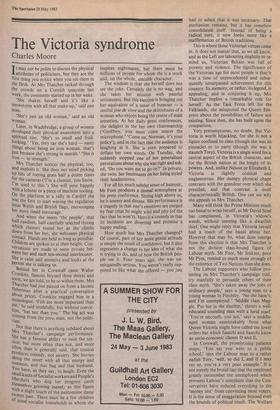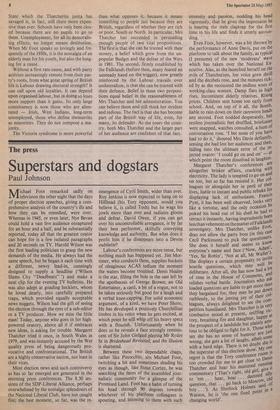The Victoria syndrome
Charles Moore
It may not be polite to discuss the physical attributes of politicians, but they are the first thing you notice when you see them in the flesh. As Mrs Thatcher tacked through the crowds on a Cornish quayside last week, the comments started up in her wake.
`She shakes herself and it's like a snowstorm with all that make-up,' said one man.
'She's just an old woman,' said an old woman.
Later, in Wadebridge, a group of women developed their physical assessment into a spiritual one, 'She's so small and frail- looking."Yes, they say she's hard — nasty things about being an iron woman. that's Just because she's strong in morals.' She is iron — in strength.'
Mrs Thatcher notices the physical, too, and exploits it. She does not mind picking up bits of rotting grass half a dozen times for the cameras ('I'm a chemist, you know. I'm used to this.') She will pose happily with a lobster or a piece of machine tooling. On the platform at a rally in Cardiff she Was the first to start waving the regulation issue Welsh and British flags, encouraging her more timid entourage.
And when she meets 'the people', that half-random, half-carefully selected throng which clusters round her as she climbs down from her bus, she welcomes physical contact. Hands are held as long as possible. Children are spoken to at their height. Con- versations are made to seem private bet- ween her and each ten-second interlocutor. She is calm and attentive and looks at the person she is talking to. Behind her in Cornwall came Walter Cronkite, famous beyond these shores and soon, we are told, to be so within them. Mrs Thatcher had just passed on from a laconic fisherman after a practical conversation about prices. Cronkite engaged him in a monologue. 'Fish are more important than me,' he said truthfully, but without convic- tion, 'but not than you.' The big act was
coming from the press man, not the politi- cian.
Not that there is anything subdued about Mrs Thatcher's campaign performance. She has a famous ability to raise the ten- sion; but more often than not, and more often than is generally said, that tension produces comedy, not anxiety. She hurries along the street with all that energy and neatness, and that bag and that husband. You have, as they say, to laugh. Even the small knots of Socialist workers and People's Marchers who dog her progress catch themselves grinning inanelj as this figure with a slight touch of the pantomime dame sweeps past. There must be a few children of good socialist households in whom she
inspires nightmares, but there must be millions of people for whom she is a stock and, on the whole, amiable character.
The wisdom is that she herself does not see the joke. Certainly she is no wag, and she takes her mission with painful seriousness. But this election is bringing out her equivalent of a sense of humour — a zestful joie de vivre and the skittishness of a woman who enjoys being the centre of male attention. At her daily press conferences, she delights in the her own chairmanship ('Geoffrey, you must come nearer the microphone,' Come on, Norman, it's your policy'), and in the fact that the audience is laughing at it. She is even prepared to deflate her own words, On Tuesday, she suddenly stopped one of her generalised perorations about why she was right and ask- ed, `Do you want me to go on?' In private, she twits her lieutenants on her being styled their headmistress.
For all his much subtler sense of humour, Mr Foot produces a dismal atmosphere at his press conference. Sitting high above us, he is uneasy and distant. His performance is a tragedy in that one's emotions are purged by fear (that he might win) and pity (of the fact that he won't). Hers is a comedy in that its incidents are diverting and promise a happy ending.
How much has Mrs Thatcher changed? Of course, part of her more genial attitude is simply the result of confidence; but it also represents a change in her idea of what she is trying to do, And of how the British peo- ple see it. Four years ago, she was un- mitigatedly serious. You weren't really sup- posed to like what she offered — you just had to admit that it was necessary. That puritanism remains, but it has somehow consolidated itself. Instead of being a radical cure, it now looks more like a reaffirmation of British traditions.
This is where those Victorian virtues come in. It does not matter that, as we all know, and as the Left are labouring mightily to re- mind us, Victorian Britain was full of poverty and violence. The significance of the Victorian age for most people is that it was a time of unprecedented and subse- quently unsurpassed achievement for this country. Its memory, or rather, its legend, is appealing, and in conjuring it up, Mrs Thatcher implies a remarkable role for herself. As the Task Force left for the Falklands, she misquoted the Queen Em- press about the possibilities of failure not existing. Since then, she has built upon the comparison.
Very presumptuous, no doubt. But Vic- toria is worth hijacking, for she is not a figure confined to class (though she was its pinnacle) or to party (though she was a staunch Tory). Victoria is a single word for a central aspect of the British character, and for the British nation at the height of its powers. And, unlike Nelson or Elizabeth I, Victoria is slightly comical and unglamorous. Her dumpy physical chape contrasts with the grandeur over which she presided; and that contrast is itself characteristically British. One can see why she appeals to Mrs Thatcher.
Many will think the Prime Minister much too banal to wrap herself, as Mr David Steel has complained, in Victoria's widow's weeds, without seeming like a dwarfish thief. One might reply that Victoria herself had a touch of the banal about her. However that may be, what does emerge from this election is that Mrs Thatcher is not the divisive class-bound figure of Labour myth. Mr Foot, Mr Jenkins, poor Mr Pym, remind us much more strongly of the existence of Two Nations than she does.
The Labour supporters who follow pro- testing on Mrs Thatcher's campaign trail, try manfully to persuade others of their class myth. 'She's taken away the jobs of ordinary people,' says a young man to a young woman in Finchley. `No she hasn't; and I'm unemployed.' Middle class Mag- gie. Put her in the dustbin,' shouts a well- educated sounding man with a lurid scarf. `You're uncouth, you are,' says a middle- aged woman unmistakably from what Queen Victoria might have called the lower orders but which Saatchi and Saatchi know as socio-economic classes D and E.
In Cornwall, the proselytising patience snaps. 'You say you went to a public school,' says the Labour man to a rather oafish Tory, 'well, so did I, and if I may say so, you're a very poor example.' It is not merely the brutal fact that the employed greatly outnumber the unemployed which prevents Labour's complaint that the Con- servatives have reduced everything to the `money test' from convincing most voters. It is the sense of exaggeration beyond even the bounds of political insult. The Welfare
State which the Thatcherite junta has savaged is, in fact, still there more expen- sive than ever. Schools have only been clos- ed because there are no pupils to go to them. Unemployment, for all its demoralis- ing effects, no longer means destitution. When Mr Foot speaks so lovingly and fre- quently of the 1930s, it is the nostalgia of an elderly man for his youth, but also the long- ing for a cause.
Without a first rate cause, and with party activists increasingly remote from their par- ty's roots, from what great spring of British life is Labour drawing electoral strength? It can call upon old loyalties. It can depend upon organised labour, but in doing so loses more support than it gains. Its only large constituency is now those who are alien- tated — Irish, West Indians, long-term unemployed, those who define themsevles as minorities. They do not compose a ma- jority.
The Victoria syndrome is more powerful than what opposes it, because it means something to people just because they are British, regardless of whether they are rich or poor, South or North. In particular, Mrs Thatcher has succeeded in persuading enough people of two vital propositions. The first is that she can be trusted with their money, a belief which grew from the un- popular Budget and the defeat of the Wets in 1981. The second, firmly established by the Falklands (before then, many feared an unsteady hand on the trigger), now greatly reinforced by the Labour travails over unilateralism, is that she can be trusted with their defence. Belief in these two proposi- tions equal belief in the reasonableness of Mrs Thatcher and her administration. You can believe them and still think her strident and tedious. The fact is that she has become part of the British way of life, even, for many, its defender. As she tours the coun- try. both Mrs Thatcher and the larger part of her audience are confident of that fact.















































 Previous page
Previous page